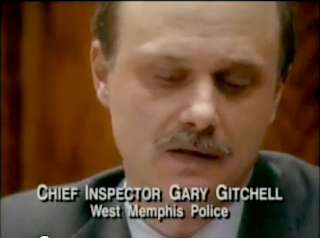This week Film Appreciation visits West Memphis, Arkansas as Jay Burleson remembers a life-changing documentary.
Paradise Lost: The Child Murders at Robin Hood Hills (1996)
Directed by Joe Berlinger and Bruce Sinofsky
It's difficult to delve into a film appreciation article about a documentary. I did it once before with American Movie, but the approach was completely different than it is here. Paradise Lost is much more terrifying, and to write about how much I love it almost feels wrong. It's real, a true story about three murdered children in Arkansas, but it's also important, and very much worth the praise. Paradise Lost serves as one of the main catalysts for three Arkansas men walking away from life sentences after being convicted of the aforementioned murders-- even if it did take almost 18 years for that to happen.
On one hand, a lot of people consider the three to be guilty and blame Paradise Lost for starting the media firestorm that led to their release. They believe that the film and its sequels were completely one-sided as to the innocence of the accused. I can agree on the two sequels, but would wager that the original Paradise Lost is mostly even. On the other hand, how partial are the filmmakers entitled to be when it comes to something they believe in? Especially something as important as the lives of three innocent teenagers.
The story itself is set in West Memphis, Arkansas, a city mainly known as a truck stop hub that sits just inside the state line and is an extension of Memphis, Tennessee. It was in West Memphis that three young boys were murdered in May of 1993, which led filmmakers Joe Berlinger and Bruce Sinofsky there to document the tragedy. The parents of the victims are featured largely in the beginning, and the filmmakers are granted unlimited access to both trials of the accused. The unbelievable amount of freedom that is granted to the filmmakers goes a long way in making this such a jaw dropping documentary. Every bit of information is available, and you don't have to worry about seeing "Our cameras weren't allowed inside" every ten minutes like in some documentaries.
The three accused, who became known as the West Memphis Three, are also interviewed from jail and a good bit of time is spent with their parents. The case against them is largely based on the confession of one of the three, Jessie Misskelley, whose IQ is brought into question. The defense attempts to persuade the jury that Misskelley's confession was coerced, but despite their efforts he is convicted separately from the other two defendants, Damien Echols and Jason Baldwin. Both trials are documented in the film and we get a first hand look at Satanic ritual claims made by the prosecution. The late '80s and early '90s were ripe with what is now known as "Satanic Panic" and the West Memphis case is no exception. I'm not saying that Echols and the other two weren't interested in the occult, but I don't think anyone on either side still believes that these murders were in any way a part of a ritual for Satan. This documentary gives glimpses into an epidemic that swept across America during this time period, and even touched home where I'm from. Late '80s newspaper clippings are full of claims of Satanism in my area. I find it to be a fascinating aspect of our history, and its involvement in this case is very fitting to the time frame.
Paradise Lost is wonderfully shot and very cinematic for a documentary. Beautiful aerial footage of the towns of West Memphis and Marion, Arkansas are used from time to time and this really helps to separate the film in terms of presentation. The opening aerial shot looms over the highway as it leads us to the Blue Beacon truck wash and the Blue Beacon/Robin Hood Hill woods where the bodies of the victims were discovered. Another time the aerial footage leads us from a previous location to the home of one of the accused. It's effective camera work and is superb in putting you into the locations. The soundtrack features music from Metallica, which hits close to home as the accused were fans of heavy metal bands, Metallica being one of them. Upon my first viewing, as a young teenager, I had never heard Metallica before. It's safe to say that after viewing the film, which mainly featured tracks from the Master of Puppets album, I became a big fan of that particular CD.
My appreciation for this film continues to grow over time. Since the West Memphis Three were freed last year, I have dedicated more time to studying the case than I ever did as a teenager. While I can understand how some people view the films as being completely one-sided, I still strongly say that they serve a great purpose. It is hard for me to be convinced that there weren't some shady things going on in West Memphis, Arkansas during the investigation and trials. This documentary, and the ones that follow, do a great job of raising awareness for their cause. From there, it is up to the viewer to continue their research and form their own opinion. All of the case documents and much more can be found here: http://callahan.8k.com/







May have to check this out.
ReplyDelete